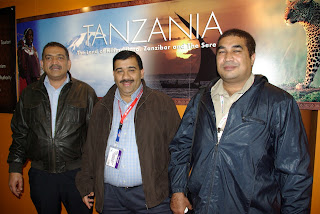 The EAST AFRICA COMMUNITY AT THE WORLD TRAVEL MARKET
The EAST AFRICA COMMUNITY AT THE WORLD TRAVEL MARKET








By Babalola Abudu, PANA Correspondent
Lagos, Nigeria (PANA) - As 17 African countries out of the continent's 53 nation s this year celebrate half a century of political independence from colonial rule, many experts are expressing divergent views on whether the occasion is really worth celebrating.
The 17 countries include Niger, Nigeria, Senegal, Somalia, Togo, Gabon, Madagasc ar and Mali. Others are Mauritania, Cote d'Ivoire, Democratic Republic of Congo (DRC), Congo, Chad, Central African Republic, Camer oon, Burkina Faso and Benin Republic.
All the 17 countries gained independence the same year in 1960, but at differen t months of the year. So far, 11 countries have already marked the Golden Jubilee of their independence.
Those who believe the massive celebration is not worthwhile point to the huge so cio-political-economic challenges confronting the continent.
''As for political independence, most of Africa has achieved that. But as for p olitical independence on soft foundation of economic independence, we have not even started. So I think there is a lot to reflect on, not to celebrate,'' a Senior Research Fellow at the Nigerian Institute of International Affairs (NIIA) in Lagos, Charles Dokubo, told PANA.
''In terms of dealing with stability and development, most of these countries ha ve not carried out development in the real sense that affects all the facets of the society in Africa. So these are the problems we face, it i s not that these problems are not known but the policies and strategies to put them into fruition had not been pursued in such a way that will impact positively on the generality of the people in Africa,'' he added.
Of the 28 African countries that have hit and passed 50 years of self rule - rep resenting more than half of the 53 African countries - most of them did so this year. Thus, 2010 is considered as the ''African Year''.
But many experts agree with Dokubo that the occasion calls for reflection, rathe r than celebration.
According to Prof. Segun Odunuga of the Olabisi Onabanjo University, Ago-Iwoye i n South-west Nigeria, most African countries remain politically fragile, several years after independence, as seen in pre and post elections wrangles, we ak economic base and defective institutions.
Also, he said, many political leaders have not behaved any different from the co lonial rulers they wrestled power from, with the sit-tight syndrome becoming the order of the day. The constitution which is suppose to serve as gui ding principle of governance are subverted to serve selfish interest and in most cases are manipulated to achieve selfish political ends, th ereby heating up the political system..
After several years of military intervention in Africa, starting with the first coup in Egypt in 1952, democracy started taking roots in most African countries in the early 1990s.
Democracy and development, many experts believe, go hand in hand, but the oppos ite seems to be the situation in Africa. Despite many years of democratic rule, poverty, hunger, corruption, conflicts, xenophobia and instabil ity, still remained big problems on the continent.
''The fact is that the democratic dividends we talk about in Africa are few and far between. I think most African countries are suffering from what I call democratic deficits, no dividends,'' Dokubo said.
Despite recent gains in many African countries in human and economic development , there has been a decline in political rights, personal safety and the rule of law, according to the 2010 Mo Ibrahim index, which measured the deli very of public goods and services to citizens by government in Africa.
The index, released last month, ranked the 53 African countries using 88 indicat ors across four main categories as proxies for the quality of the processes and outcomes of governance: safety and rule of law, participation and human rights, sustainable economic opportunity and human development. The 2010 index also includes new indicators in the following areas: HIV/AIDS gov ernance, water and sanitation provision, statistical capacity and gender.
''Overall, governance quality remains largely unchanged from previous years, wit h a continental average score of 49. However, this average masks large variation in performance across countries,'' the index shows.
Many Africans believed that given the continent's huge human and material resour ces, it is yet to attain its full potentials. However, many are quick to put the blame for the continent's present situation on many years of colonial ism, slavery and neo-colonialism.
But Dr. Mo Ibrahim, the Sudanese born billionaire and founder of the Mo Ibrahim Foundation, disagrees.
In a paper he delivered in Accra, Ghana, recently, he said: ''For 50 years, we h ave been responsible for our destiny, but unfortunately, we have failed, my father's generation has failed, my generation has failed and the only hope fo r us now is the young generation.
''We are handing to you a really misery continent, it is in your hand to sort it out, but you cannot sort it out unless we know our shortcomings, where we went wrong,'' he said.
As the countries begin the journey into their centenary, Ibrahim's words may jus t be the much-needed tonic they need to ensure a better deal for Africa and its long suffering people in the next 50 years.
Lagos - 09/11/2010






























































No comments:
Post a Comment